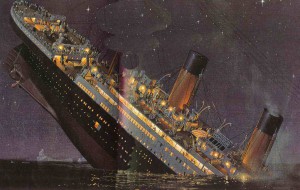 The British, unlike their American cousins, have an overwhelming need to move about using bipedal locomotion. Strange, right? We saw them outside, walking round and round on the Promenade deck in all types of weather, including rain, mist, drizzle, high winds, really high winds and rough seas. If there had been a hurricane, there still would have been a couple of Brits out there, the older the better, trying to take a wee bit of a ramble, before tea, so they could work up a spot of an appetite. All those stories about British explorers expiring on their polar explorations? It’s because they tried to walk there, instead of waiting till someone invented airplanes, so they could fly there.
The British, unlike their American cousins, have an overwhelming need to move about using bipedal locomotion. Strange, right? We saw them outside, walking round and round on the Promenade deck in all types of weather, including rain, mist, drizzle, high winds, really high winds and rough seas. If there had been a hurricane, there still would have been a couple of Brits out there, the older the better, trying to take a wee bit of a ramble, before tea, so they could work up a spot of an appetite. All those stories about British explorers expiring on their polar explorations? It’s because they tried to walk there, instead of waiting till someone invented airplanes, so they could fly there.
We’ve eaten more canapés in the past week then in the past three years. Three years in which we ate zero canapés, so it wasn’t much of a stretch. When did Americans give up eating canapés, and why? I mean, first you get to say ‘canapés’, which just sounds swanky. Second, what’s not to like about tiny bite size morsels of snacky goodness? We should all eat more canapés. If hipsters want to do something useful, they could make canapés trendy, instead of fedoras, skinny jeans and artisanal, locally sourced vegan tempeh burgers.
From what we observed, transiting the Atlantic in early October, the weather seems to consist primarily of windy, windier, windiest, foggy, drizzle, drizzly fog, more wind, medium sized waves, with the occasional larger wave, timed to cause a lurch just as you were taking a sip of coffee. And all that is when you don’t encounter any storms. The ship, big as it is, rock and rolls righteously, which we didn’t mind at all. Others, more susceptible to seasickness, might not have been as blithe. Indeed, the people at the table next to ours in the dining room, made it to dinner the first night, then disappeared, never to be seen again.
We ran into fog the final two days at sea and I discovered that they still use foghorns which I seriously thought would have gone the way of buggy whips, what with satellites, radar and GPS.
While voyaging across the Atlantic, you do go through five time zones. Rather than move the clocks ahead at night, Cunard does it at noon every day. It’s a little weird to be awake when the clocks change, like cut-rate time travelling. One minute you’re thinking, ‘hey, it’s almost time for lunch’ and literally a minute later you’re, “OMG, come one, it’s already one o’clock, we’re going to miss lunch!” Because, at sea, on an ocean liner, your biggest concern is missing a meal.
